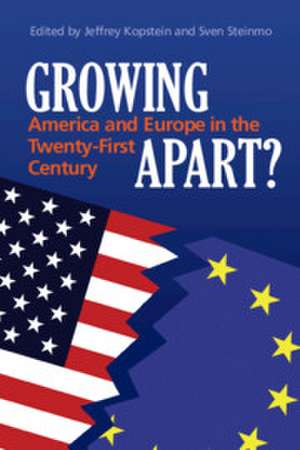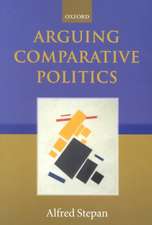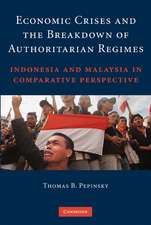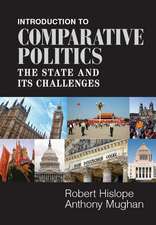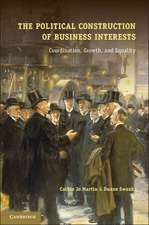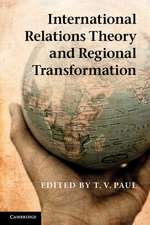Growing Apart?: America and Europe in the 21st Century
Editat de Jeffrey Kopstein Autor Sven Steinmoen Limba Engleză Hardback – 18 noi 2007
| Toate formatele și edițiile | Preț | Express |
|---|---|---|
| Paperback (1) | 236.78 lei 6-8 săpt. | |
| Cambridge University Press – 18 noi 2007 | 236.78 lei 6-8 săpt. | |
| Hardback (1) | 497.12 lei 6-8 săpt. | |
| Cambridge University Press – 18 noi 2007 | 497.12 lei 6-8 săpt. |
Preț: 497.12 lei
Preț vechi: 558.57 lei
-11% Nou
Puncte Express: 746
Preț estimativ în valută:
95.12€ • 99.32$ • 78.73£
95.12€ • 99.32$ • 78.73£
Carte tipărită la comandă
Livrare economică 04-18 aprilie
Preluare comenzi: 021 569.72.76
Specificații
ISBN-13: 9780521879316
ISBN-10: 0521879310
Pagini: 254
Ilustrații: 10 tables
Dimensiuni: 162 x 242 x 18 mm
Greutate: 0.48 kg
Ediția:New.
Editura: Cambridge University Press
Colecția Cambridge University Press
Locul publicării:New York, United States
ISBN-10: 0521879310
Pagini: 254
Ilustrații: 10 tables
Dimensiuni: 162 x 242 x 18 mm
Greutate: 0.48 kg
Ediția:New.
Editura: Cambridge University Press
Colecția Cambridge University Press
Locul publicării:New York, United States
Cuprins
Introduction: growing apart? America and Europe in the 21st century Sven Steinmo and Jeffrey Kopstein; 1. The religious divide: why religion seems to be thriving in the United States and waning in Europe Steven Pfaff; 2. Value change in Europe and North America: convergence or something else? Christopher Cochrane, Neil Nevitte and Steve White; 3. On different planets: news media in the U.S. and Europe Donald Morrison; 4. One ring to bind them all: American power and neoliberal capitalism Mark Blyth; 5. Spreading the word: the diffusion of American conservatism in Europe and beyond Steven Teles and Daniel Kenney; 6. Work, welfare, and wanderlust: immigration and integration in Europe and North America Randall Hansen; 7. Lost in translation: the transatlantic divide over diplomacy Daniel W. Drezner; 8. The Atlantic divide in historical perspective: a view from Europe Laurent Cohen-Tanugi.
Recenzii
"The question of whether the United States and Europe will or even should remain closely allied is a critical and much debated one. Bringing together some of the most impressive scholars on both sides of the Atlantic, this book grapples with this question from a wide range of angles. It will be a ‘must-read’ for all concerned with U.S.-European relations, the ‘future of the West,’ and the way in which international and domestic factors interact to produce policy outcomes."
Sheri Berman, Barnard College
"Whether the West maintains its cohesion in the face of growing differences across the Atlantic is one of the most important and interesting questions in world affairs. The contributors to this volume provide outstanding analyses of a range of political, economic and cultural issues that make this book invaluable to anyone concerned about the future of Transatlantic relations."
James Goldgeier, George Washington University
"A thorough, thoughtful and provocative treatment. The topic selection is excellent, and a number of essays are superb, especially those of Cohrane et al., Cohen-Tangui, and Drezner. Readers may – and even should – disagree with some of the assessments, but this is likely to become a widely-cited account of European-American relations at the present time."
Robert J. Lieber, Georgetown University
"Tocqueville was convinced that nineteenth-century America was the mirror where old societies of Europe could contemplate their inexorable fate. Kopstein and Steinmo by contrast wonder if Europe and America are not growing apart. They do not provide a clear-cut answer to the question, but offer us a rich analysis of the trends which sometimes work in a rather complex and contradictory way. The aphorism according to which ‘Britain and America are two peoples divided by the same language’ might work for Europe and the US as well. They use the same semantics: liberalism, democracy, fundamental rights – but give them contrasting interpretations. Here is the paradox: Divorce is impossible but living together is not easy. Thanks to Kopstein, Steinmo, and their collaborators, we get a better and updated understanding of this unhappy couple."
Yves Mény, President, European University Institute
"Several important theories in the social science have for long predicted that countries that share the same basic economic organizing principles would converge in their politics and social organization. This volume shows that at least in one very important respect, this is not the case. On the contrary, there is an increasing variation in political behavior, social outcomes, and ideological beliefs among the industrialized capitalist market dominated countries. Both the political elite and ‘people in general’ in Western Europe and the United States respectively have increasingly divergent ideas about what type of society they want to build. In an elegant and sophisticated way, this volume addresses head on this puzzle of why ‘the west’ is growing apart. It contains several surprising and counterintuitive findings and ideas and deserves a wide audience."
Bo Rothstein, August Röhss Chair in Political Science at Göteborg University
"Insightful...absorbing."
Perspectives on Politics, David M. Andrews, Scripps College
Sheri Berman, Barnard College
"Whether the West maintains its cohesion in the face of growing differences across the Atlantic is one of the most important and interesting questions in world affairs. The contributors to this volume provide outstanding analyses of a range of political, economic and cultural issues that make this book invaluable to anyone concerned about the future of Transatlantic relations."
James Goldgeier, George Washington University
"A thorough, thoughtful and provocative treatment. The topic selection is excellent, and a number of essays are superb, especially those of Cohrane et al., Cohen-Tangui, and Drezner. Readers may – and even should – disagree with some of the assessments, but this is likely to become a widely-cited account of European-American relations at the present time."
Robert J. Lieber, Georgetown University
"Tocqueville was convinced that nineteenth-century America was the mirror where old societies of Europe could contemplate their inexorable fate. Kopstein and Steinmo by contrast wonder if Europe and America are not growing apart. They do not provide a clear-cut answer to the question, but offer us a rich analysis of the trends which sometimes work in a rather complex and contradictory way. The aphorism according to which ‘Britain and America are two peoples divided by the same language’ might work for Europe and the US as well. They use the same semantics: liberalism, democracy, fundamental rights – but give them contrasting interpretations. Here is the paradox: Divorce is impossible but living together is not easy. Thanks to Kopstein, Steinmo, and their collaborators, we get a better and updated understanding of this unhappy couple."
Yves Mény, President, European University Institute
"Several important theories in the social science have for long predicted that countries that share the same basic economic organizing principles would converge in their politics and social organization. This volume shows that at least in one very important respect, this is not the case. On the contrary, there is an increasing variation in political behavior, social outcomes, and ideological beliefs among the industrialized capitalist market dominated countries. Both the political elite and ‘people in general’ in Western Europe and the United States respectively have increasingly divergent ideas about what type of society they want to build. In an elegant and sophisticated way, this volume addresses head on this puzzle of why ‘the west’ is growing apart. It contains several surprising and counterintuitive findings and ideas and deserves a wide audience."
Bo Rothstein, August Röhss Chair in Political Science at Göteborg University
"Insightful...absorbing."
Perspectives on Politics, David M. Andrews, Scripps College
Notă biografică
Descriere
Scholars analyze why and how the United States pulled away from its democratic allies following the Cold War.
